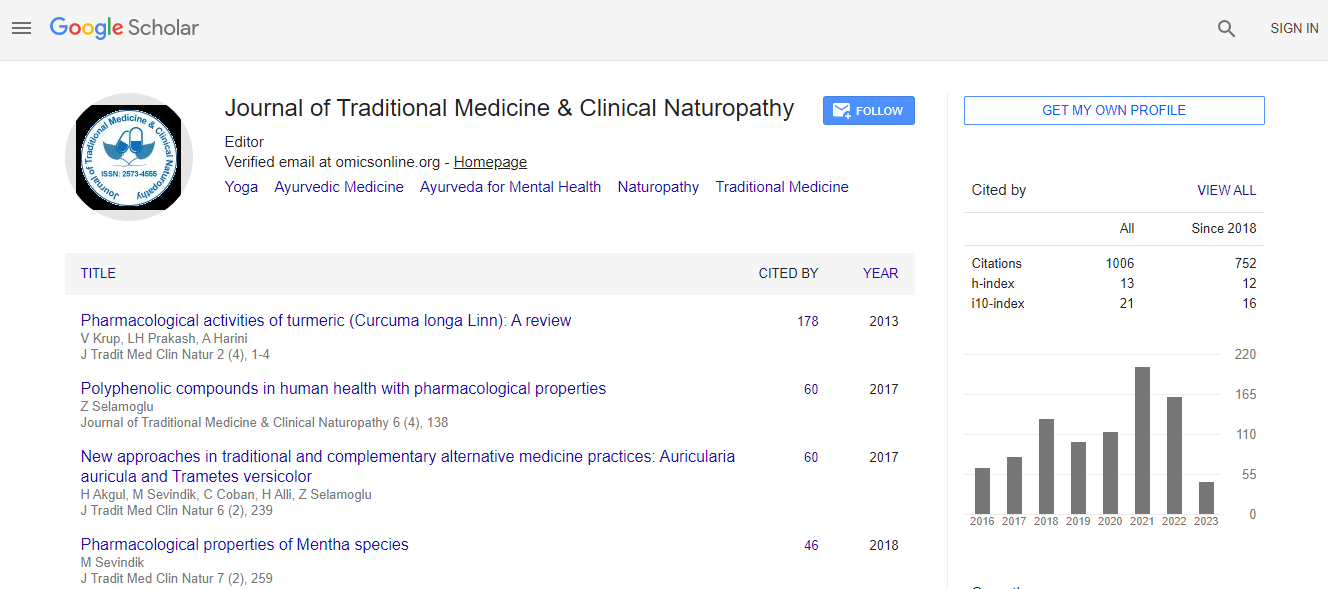Research Article
Identification of a Proteinaceous Alpha Amylase Inhibitor from a Medicinal Herb Oxalis corniculata L. (Oxalidaceae)
| Jyothi KSN1 , Shailaja M2, Viveni J2 and Suresh C3* | |
| 1Acharya Nagarjuna University, Guntur, AP, India | |
| 2Osmania University College for Women, Koti, Hyderabad, Telangana, India | |
| 3Department of Biochemistry, National Institute of Nutrition, Tarnaka, Hyderabad, Telangana, India | |
| Corresponding Author : | Suresh C Scientist and Assistant Director Department of Biochemistry National Institute of Nutrition Indian Council of Medical Research Department of Health Research Govt. of India, Hyderabad-500007, India Tel: +91-40-27197349 Fax: +91-40-27019074 E-mail: sureshnin2000@gmail.com |
| Received August 11, 2014; Accepted August 25, 2014; Published August 28, 2014 | |
| Citation: Jyothi KSN , Shailaja M, Viveni J, Suresh C (2014) Identification of a Proteinaceous Alpha Amylase Inhibitor from a Medicinal Herb Oxalis corniculata L. (Oxalidaceae). J Homeop Ayurv Med 3:165. doi: 10.4172/2167-1206.1000165 | |
| Copyright: © 2014 Suresh C, et al. This is an open-access article distributed under the terms of the Creative Commons Attribution License, which permits unrestricted use, distribution, and reproduction in any medium, provided the original author and source are credited. | |
Abstract
Health management through traditional medicine is a promising approach worldwide as it represents a multifaceted approach to health care than conventional medicine. The heightened importance to validate the efficacy and standards of traditional herbal medicine is the thrust area of present day research. The present study is one such attempt to evaluate the alpha amylase inhibitory potential and identify the candidate inhibitor from Oxalis corniculata L, a potent indigenous medicinal plant. Sequential solvent extraction of the leaves of O. corniculata was performed in previous work and the aqueous extract, showing maximum inhibition against porcine pancreatic alpha amylase against starch as substrate (IC50 value 68.08+0.06), was selected for purification using ammonium sulphate precipitation. The pellet obtained at 40%-80% precipitation was further subjected to ion exchange chromatography on DEAE-cellulose and gel filtration chromatography using Sephadex G-100. The molecular weight of the proposed amylase inhibitor named AI-1 was estimated to be about 30 kda on SDS-PAGE. Temperature sensitivity and pH stability of the inhibitor was studied. The AI-1 protein was stable up to 400 C and was totally destroyed beyond 700 C and showed maximum activity at pH 6. Further characterization of the AI-1 protein and its sequence determination will help in discovering a novel proteinaceous alpha amylase inhibitor from O. corniculata. Research of this kind will help to usher the identification of active bioconstituents from plants with great medicinal activities.

 Spanish
Spanish  Chinese
Chinese  Russian
Russian  German
German  French
French  Japanese
Japanese  Portuguese
Portuguese  Hindi
Hindi 
